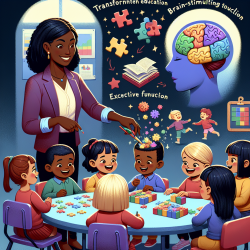Introduction
In the quest for educational excellence, the Randomized control trial of Tools of the Mind: Marked benefits to kindergarten children and their teachers offers compelling insights into how we can transform kindergarten education. This blog explores the remarkable findings of this study, highlighting the potential of the Tools of the Mind (Tools) program to enhance executive functions, academic performance, and the overall classroom experience.
The Power of Executive Functions
Executive functions (EFs) such as self-control and attention-regulation are critical for academic success and social-emotional well-being. The study found that Tools significantly improved these skills in kindergarten children, leading to better academic outcomes and reduced behavioral issues. This emphasizes the importance of integrating EF development into early childhood education.
Academic Excellence
One of the most striking findings was the improvement in reading and writing skills among children in the Tools program. By the end of the kindergarten year, children in Tools classes were three times more likely to read at a Grade 1 level or higher compared to their peers in traditional classes. Additionally, Tools students showed remarkable progress in writing, with many able to compose multiple sentences independently.
Creating a Positive Classroom Environment
The Tools program also fostered a supportive and inclusive classroom environment. Teachers reported a significant reduction in peer ostracism and bullying, with children demonstrating more prosocial behaviors such as helping and supporting one another. This positive social dynamic contributed to a more joyful and engaging learning experience for both students and teachers.
Reducing Teacher Burnout
Teacher burnout is a growing concern in education, but the Tools program offers a promising solution. The study found that Tools teachers were more enthusiastic and energized about teaching, with many expressing excitement about the upcoming school year. This renewed passion for teaching is attributed to the program's ability to create a more manageable and rewarding classroom environment.
Conclusion
The Tools of the Mind program demonstrates that a curriculum focused on executive functions, social-emotional learning, and academic skills can lead to exceptional outcomes for kindergarten children. By fostering a supportive classroom environment and reducing teacher burnout, Tools not only enhances academic performance but also promotes a positive and sustainable educational experience.
For practitioners looking to improve their skills, implementing the Tools program or conducting further research into its methodologies could be transformative. To read the original research paper, please follow this link: Randomized control trial of Tools of the Mind: Marked benefits to kindergarten children and their teachers.










